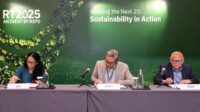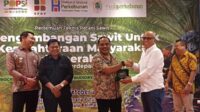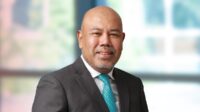PALMOILMAGAZINE, KUALA LUMPUR — The Chief Executive Officer of the Roundtable on Sustainable Palm Oil (RSPO), Joseph D’Cruz, has called on all members and stakeholders of the global palm oil industry to strengthen their support for smallholders. His message was delivered during the keynote speech at the RSPO Annual Roundtable Conference on Sustainable Palm Oil (RT2025), in Kuala Lumpur on Monday (Nov 3, 2025).
Joseph reminded participants that amid growing global challenges, the collaborative spirit that founded RSPO two decades ago must continue to be upheld.
“Last year in Bangkok, we celebrated RSPO’s 20th anniversary and reaffirmed our commitment to building a sustainable future for the next 20 years and beyond. Our greatest asset is the belief that progress is a shared responsibility,” he said.
According to Joseph, genuine sustainability can only be achieved through cooperation across the value chain—from farmers and processors to buyers.
“Sustainability is not the responsibility of one party alone. It is a collective effort to share both the burden and the benefits,” he added.
Also Read:
Real Collaboration on the Ground
Joseph emphasized that RSPO’s collaboration is not mere rhetoric but has resulted in tangible impacts on the ground. He shared several inspiring stories from smallholders in different countries.
“In Jambi, Indonesia, RSPO-certified smallholders celebrated the restoration of a local river after five years of rehabilitation funded by the sale of RSPO credits,” he said.
In San Pablo, Colombia, the smallholder group PromoAgrosur transformed land once marked by conflict and poverty into a sustainable oil palm plantation with support from the Smallholder Support Fund. Meanwhile, in Ghana, a farmer shared how oil palm has become a vital source of livelihood.
“He managed to send four of his children to school, start a business for his wife, and begin building a home—all from his palm oil income,” Joseph recounted.
Also Read:
For him, supporting smallholders goes far beyond certification or production volume.
“It’s about creating long-term value, strengthening livelihoods, and protecting the landscapes where they live and work,” he stressed.
Smallholders Under Regulatory Pressure
However, behind these success stories lies a growing concern. Joseph highlighted the mounting challenges smallholders face globally. Regulations such as the European Union Deforestation Regulation (EUDR) have begun to curb demand for smallholder credits. At the same time, government budget cuts have reduced development funding, while shifting tariff policies disrupt long-established trade relations.
“It is often said that the smallest hands bear the heaviest burdens. In our industry, those hands belong to smallholders, who now carry increasing pressures with diminishing support,” he said with concern.
A Call to Honor Shared Commitments
In light of these challenges, Joseph urged all RSPO members to renew their commitment to the principle of shared responsibility, the very foundation of the organization.
“Our smallholders have done their part. They have proven that sustainable production is possible. They have undergone audits, achieved certification, and upheld their commitments. Now, they are asking us to keep ours,” he stated.
According to him, sustainability must not be viewed merely as a business strategy or a means of market access.
“Our commitment is more than a transaction—it’s an act of global solidarity. Now is the time to stand with those who are most vulnerable within our global palm oil family,” Joseph concluded. (P1)





































